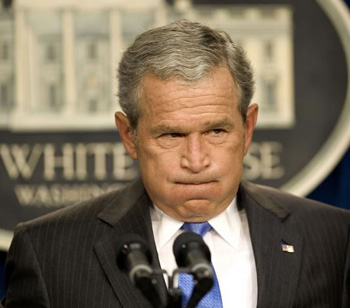WASHINGTON (AP) - President Bush is bringing presidential candidates Barack Obama and John McCain into negotiations on a $700 billion rescue of Wall Street as Democrats and Republicans near agreement on a bailout plan with more protections for taxpayers and new help for distressed homeowners. Senior lawmakers and Bush administration officials have cleared away key obstacles to a deal on the unprecedented rescue, agreeing to include widely supported limits on pay packages for executives whose companies benefit. They're still wrangling over major elements, including how to phase in the eye-popping cost - a measure demanded by Democrats and some Republicans who want stronger congressional control over the bailout - without spooking markets. A plan to let the government take an ownership stake in troubled companies as part of the rescue, rather than just buying bad debt, also was under intense negotiation. A bipartisan meeting was set for Thursday to begin drafting a compromise, which top Democrats said they hoped could pass within days.
The core of the plan envisions the government buying up sour assets of shaky financial firms in a bid to keep them from going under and to stave off a potentially severe recession. Bush acknowledged in a prime-time television address Wednesday night that the bailout would be a "tough vote" for lawmakers. But he said failing to approve it would risk dire consequences for the economy and most Americans.
"Without immediate action by Congress, America could slip into a financial panic, and a distressing scenario would unfold," Bush said as he worked to resurrect the unpopular bailout package. "Our entire economy is in danger." Bush's warning came soon after he invited Obama and McCain, one of whom will inherit the economic mess in four months, as well as key congressional leaders to a White House meeting Thursday to work on a compromise. With the administration's original proposal considered dead in Congress, House leaders said they were making progress toward revised legislation that could be approved. Rep. Barney Frank, D-Mass., who has led negotiations with Treasury Secretary Henry Paulson on the package, said that given the progress of the talks, the White House meeting was a distraction.

"We're going to have to interrupt a negotiating session tomorrow between the Democrats and Republicans on a bill where I think we are getting pretty close, and troop down to the White House for their photo op," said Frank, the House Financial Services Committee chairman. "I wish they'd checked with us." Paulson and Federal Reserve Chairman Ben Bernanke have been crisscrossing Capitol Hill in recent days, shuttling between public hearings on the proposal and private meetings with lawmakers, to sell the proposal. Obama and McCain are calling for a bipartisan effort to deal with the crisis, little more than five weeks before national elections in which the economy has emerged as the dominant theme.
"The plan that has been submitted to Congress by the Bush administration is flawed, but the effort to protect the American economy must not fail," they said in a joint statement Wednesday night. "This is a time to rise above politics for the good of the country. We cannot risk an economic catastrophe." Presidential politics intruded, nonetheless, when McCain said earlier Wednesday he intended to return to Washington and was asking Obama to agree to delay their first debate, scheduled for Friday, to deal with the meltdown. Obama said the debate should go ahead. Lawmakers in both parties have objected strenuously to the rescue plan over the past two days, Republicans complaining about federal intervention in private business and Democrats pressing to tack on more conditions and help for beleaguered homeowners. But many in both parties said they were open to legislation, although on different terms than the White House has proposed. Some partisan sticking points remain. Democrats are pushing to allow bankruptcy judges to rewrite mortgages to ease the burden on consumers who are facing foreclosure - a nonstarter for Republicans.
Democrats acknowledge privately that the provision will almost certainly be dropped in the interest of a bipartisan deal. Obama told reporters it's "probably something that we shouldn't try to do in this piece of legislation." Democrats also want any potential proceeds the government reaps from the bailout to go to a fund designed to pay for housing for poor families. Many Republicans oppose the very existence of the fund, which they say is a backdoor means of funneling money to liberal political groups. Democratic demands that Congress be given greater authority over the bailout and that the government be required to help homeowners renegotiate their mortgages so they have lower monthly payments already have been accepted in principle. Under the bailout bill, which will let the government buy huge amounts of toxic mortgage-related assets, "we're now the biggest mortgage holder in town, and we can do serious foreclosure avoidance," Frank said.
